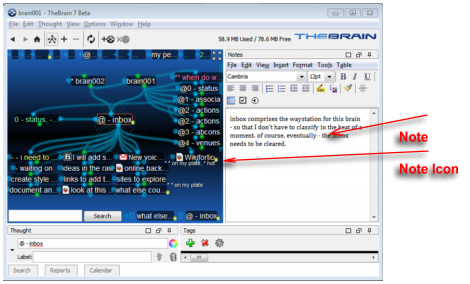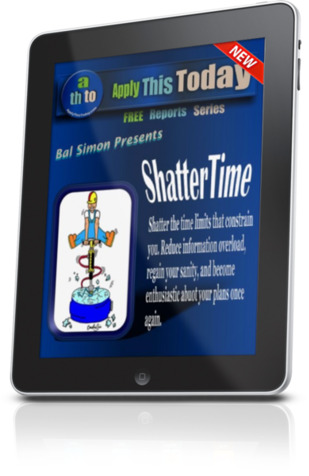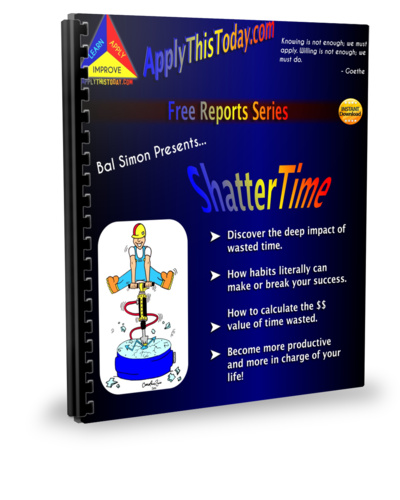What’s up with productivity?
As I write these words, I am contemplating two blog posts. The first, which inspired this writing, was a post by Cal Newport at http://bit.ly/J16l4k called Welcome to the Post-Productivity World. The second was by Lynn Terry, written more recently at http://bit.ly/J16GUP called A Day in the Life of Lynn Terry.
Cal Newport argued that blogs about productivity are no longer all that interesting to people anymore. That they are more interested in big picture stuff, about the quality of life, etc. Lynn Terry discusses how she gets things done while making sure quality of life matters are also cherished.
So what’s the real story? Well – having dealt with thousands of people over the years, I know some things will NEVER change. Why? Because we are human. We all have 24 hours in a day. No more; no less. How we spend this time is directly impacted by how productively we dance toward our goals. The quality of our time is also impacted by the style, the verve, and the panache of our dance toward our goals.
The idea of getting more and better tools is still with us. Look at the frenzy for every release of the iPad and the iPhone.
But the tools have to be intrinsically interesting, and above all they have either improve the productivity or the style of our dance toward our goals – preferably both.
Productivity is about doing things as effectively, quickly and cheaply as possible so that we can do more in less time or have more time to luxuriate in our deeper passions.
If I could show you a product that could shave off 10% of the time it takes you to write something, would that be of interest? Granted if it takes you 30 seconds to write something, 3 seconds doesn’t sound like much (though it adds up). But if you’re writing something that takes a half hour, then that’s 3 minutes. Do that just 20 times, and you’ve given yourself the gift of an hour. An hour to be productive on something else or to have coffee with a friend, etc.
Tell me that such a tool wouldn't at least garner a tad of interest.
So is Cal Newport wrong? No. Not at all. But neither is Lynn Terry nor any of the myriad of other people who involve themselves in the subject of personal productivity.
What I think is going on is that we no longer care as much about the tools, per se. After all, they are evolving – rapidly. By the time we might get attached to something, another thing is put into the public arena capable of knocking what we have off it’s perch.
And then, of course, there are "tools" that are pitched to us that have no greater likelihood of improving our productivity or our quality of life than a Turbo Entabulator...
What we need is to have these tools tie in to our lives in more significant ways. The impersonal tool made personal. The MP3 player isn’t just cool because it’s a technological marvel, but also because it helps us stay motivated as we work on data entry. Action Machine Pro (aff link) is powerful not because it’s easy to use (which it is), but mainly because it helps you automatically feel confident about the way you’re staying on track.
Your motivation. Your confidence. These are the personal results that you get from the productivity improvement.
Thus the lesson and its effect going forward: The personal matters every bit as much as the practical. This blog will, from now on, show you possible personal benefits as well as those that I myself have experienced by using a product, a tool or by following a method.

We Live in EFFECTIVE Spaces – Easily Improving Your Home
My wife, Donna, and I live in a modest house that we own. About 1600 square feet. But until recently, it felt smaller than that - a lot smaller.
We didn't set out to fix that problem; not really. We had someone come in to remodel things cosmetically, to make the house feel more comfortable - not bigger.
But something unexpected happened. The livability of the house increased far beyond expectations, and you can do something similar for a relatively low cost.
By adding light throughout the room, we went from having a room we barely used at all (it felt like a cave) to one of the most inviting rooms of the house. We effectively increased the living space of the house by that amount.
At some point I may video our living room (once we have it showcase ready). For now, here's an example of how light greatly increases the accessibility of a room.

If you are on a modest budget, and your living space includes some dark rooms, one of the least expensive and most effective ways to give your quarters a huge boost is to improve the lighting. The more natural the light, the better, but even some of the foolish green products are better than darkness.
If lamps are an option you want to explore, you can find many lamps with good reviews at Amazon.
This is a much lower cost solution than knocking out walls, and creating a major catastrophe on your way to improving things, and if you are renting, it may be your only solution.
Might be worth giving a thought or two.
Calmness is a GPS
When we try to do something, especially when we act in a public way, many of us often feel fear, anxiety, trepidation. We don't want the discomfort of failing. We don't want the secondary effects of looking bad in front of other people. We generally don't like unsolicited criticism, even if it's constructive. We don't like being made fun of. We don't like people thinking badly of us.
 So it's a great deal safer to not step up, step out, and just be a one of a million bubbles in the white water rapids of life.
So it's a great deal safer to not step up, step out, and just be a one of a million bubbles in the white water rapids of life.
After all, if you don't try, you can't fail right? What's the old saying? He who sleeps on the floor cannot fall out of bed?
But is there any fun in sleeping on the floor? Is there any great sense of being alive in not trying - in not stepping out?
What can we do about this?
The love of my life, my wife, Donna is a leader at Weight Watchers. She often uses the metaphor of a GPS.
What does your GPS do when you miss a turnout or go the wrong way?
Does it scold you? Does it make fun of you? (There's a product!) Does it tell you just what a low life you are?
No. What it does is to recalculate a new path to the goal it was given.
It doesn't change the goal. It doesn't quit on me. It doesn't tell me to go to hell, even if I screw up a hundred times on the exact same exit.
When we do things, when we aim for things, especially for things that we're not yet good at, how do we know that we've missed the mark? Don't we have an internal system that is similar to the GPS? Doesn't it tell you, "Nope - you missed the mark."
And then what do we do with this information? Do we say, "Oh - OK - now I have to go this way," as we map out a new course to the same goal? Many of us don't do that. Many of us just quit, which is to say, we give our system a new goal: go home with our tails between our legs.
Surely we can resolve to be at least as effective as a simple GPS.
What can you do if you catch yourself doing stupid emotional stuff after your inner system says you missed the mark? I recommend you simply consider it missing another turn-off and let yourself "recalculate" a path to emotional calmness.

P.S. - If you find this to be a stubborn thing, you might try the method I described in my post, Simple Procedure for Changing Your Behavior.
Can You “Ben Franklin” Your Efforts
We live in a fractured, hyper kinetic world in which it is too easy to become distracted, and we all too often get nothing done.
Most of us face this difficulty when trying to accomplish many things at once. But what about the people who seemingly do it with ease?
I see two possibilities:
1 - They are geniuses in their ability to focus on lots of different things all at once, and so they make it look easy, whereas for mere mortals it is not.
2 - They are, most of them, no more geniuses than you or I, but they have been learning things one or a few at a time, and over the course of years, they have learned to drive their productivity as easily as you might drive your car or cook dinner while putting on your gym clothes.
If they are geniuses, there's no hope. But If they're like you and me, and simply use better methods, maybe we can model them into our own lives.
 One of the best methods was championed centuries ago by Ben Franklin. Read more about it in his autobiography - http://www.gutenberg.org/cache/epub/148/pg148.html .
One of the best methods was championed centuries ago by Ben Franklin. Read more about it in his autobiography - http://www.gutenberg.org/cache/epub/148/pg148.html .
Here's the important passage for this context.
My intention being to acquire the habitude of all these virtues, I judg'd it would be well not to distract my attention by attempting the whole at once, but to fix it on one of them at a time; and, when I should be master of that, then to proceed to another, and so on, till I should have gone thro' the thirteen; and, as the previous acquisition of some might facilitate the acquisition of certain others, I arrang'd them with that view, as they stand above.
(Sidebar: Even back in the 1700s, Ben Franklin faced distraction!)
Franklin was interested in moral virtues. My interest is more general. My question for you: what things do you want to accomplish (moral, business, education, etc.) List all of them and then pick one on which you will focus.
But which one?
Franklin strategically picked, as his first one, a trait that would enable him to work more easily with the others. That's good advice. If there is one that supports others, pick that one.
The remaining question is simple: Will you do it?

A Window Into a Productive Person’s Day
I was reading a blog post by one of my favorite marketers, Lynn Terry. If you don't know her, Lynn is someone who is incredibly generous with her knowledge, and I recommend her blog at ClickNewz.com without reservation.
Lynn described a typical day.
We all have typical days. What was cool about her post was to see how productive someone can be - habitually.
It's one thing to be productive when there's a significant demand. To be productive as a matter of course is much better and more impressive.
In the course of the post, Lynn mentions a time log. This tool is exactly what it sounds it is: a log you keep of the way you spend - or waste - your time.
Lynn keeps her time log on paper. I prefer to do my tracking with a spreadsheet and was thinking of creating one to do it.
However, another marketer, who also commented on Lynn's post - Erica Cosminsky, of The Invisible Office already did it, and if you go to Lynn's blog, you can find a sample and a template there.
I have examined Erica's spreadsheets, and they are very good indeed. You can easily customize the template to include your own categories of time usage.
For example, in my spreadsheet, I have a specific category of Stupid Stuff (email, politics, etc.). If you know what you're doing with Excel, you can also add or subtract categories.
Erica has generously allowed me to re-share these spreadsheets with you here.
So What Kind Of Day Can You Have?
Do you go through your days unconsciously - one day being just like the one before it?
Do you know how you spend your time? Do you act purposefully and productively, or is your path more like the useless zigzagging of a fly in the middle of a room.
A time log can help you see into how you utilize your time.
Whether you use a pen and paper like Lynn or download the spreadsheets, there's no time like the present to get started now.
Go Even Farther
Beyond this, do you know how much your wasted time is costing you in terms of monetary value? Do you care?
If you do care, I wrote a special free report - just for you - called ShatterTime.
Among other things, ShatterTime shows you a list of common activities that many of us engage in, which are really wastes of time. How many items on my list are on yours too?
You can pick up my report - for FREE - at http://applythistoday.com/shattertime.
Bal Simon, Avenger?
When I was a little kid, I pretended I was Superman, based on the stories with the late George Reeves.
After I created the video below, I asked myself, could I ever really be an action hero, like the characters in The Avengers?
No. It is to laugh.
After all, I'm not big on wearing spandex and carrying around a magical lightning shooting hammer all day long to konk someone on the head would probably incur the wrath of insurance companies and lawyers. (I did after all, see The Incredibles.)
But there is a reason that these characters are called "action heroes." They take action. They move toward their objectives. They don't spend all day trying to "learn something new."
While the video below explains this, the main point is not actually the content. But you'll have to watch it (less than 5 minutes) to get what I mean.

At Least My Effort’s Not a Disney Flop!
I was going to post a video tonight about goals and priorities.
But a funny thing happened on the way to a video. I ran into technical difficulties. And while I'm sure I'll iron them out, I'm not going to iron them out tonight.
At least it's not the financial fiasco that Disney had with it's movie release called John Carter. I take solace in this, too. If a company as professional as Disney can have problems, there's no shame in someone like me, at my current level of experience having difficulties.
Nevertheless, I'd like this to be more than a "Well, at least I didn't do that badly" kind of entry. So let me do this.
For a very limited time, I'm going to make available a home-grown resource that I am developing for my own use. For the next 24 hours and for the first 10 people who ask for it, I am going to give you the URL to a special Mindomo mindmap that links to different kinds of videos that serve as a kind of swipe file for content creation. You can search all day long for this mindmap and never find it. And while all the videos are publicly available, I doubt anyone has brought a swipe file overlay to them along with brief editorial commentary.
If you would like lifetime access to it for as long as I am creating and maintaining it, just do the following:
- Go to my Facebook ApplyThisToday page and like it. If you've already liked it, there's obviously no need for you to do this step.
- Find the message on my page that links to this blog entry.
- Message me to tell me you want access to the mindmap. I will then message you the URL via Facebook.
And if you are so inclined, I welcome comments here and on my Facebook page. 🙂
A Rhapsodic Tip
I am a long-time subscriber of Rhapsody.com (an alternative to iTunes - at least I use it that way).
I was listening to an MP3 sample on Amazon.com about creativity, spoken by Earl Nightingale, a contemporary of Napoleon Hill, and an excellent motivational speaker.
I wondered if one could find any of his material on Rhapsdoy. Pleasantly, it's available. The selection isn't huge, but there are selections there.
And not just by Mr. Nightingale, either. I found the entire book, Think and Grow Rich available there, as well as Jim Rohn. I'm guessing there are others too.
I listened to a few tracks on creativity on my way to a meeting this morning, and rather than have a song in my head, I had things to think about instead.
Very nice.

Shredding Time
We have a small, personal paper shredder in the house, similar to this one.
But if you have a lot of paper that piles up, these little units aren't really the right tool.
We found a wonderful alternative, and maybe it's one you can use to your benefit too, depending on the resources in your geographic location. Read More...
“Missing Notes” in PersonalBrain
I'm an avid user of a nifty program called PersonalBrain. I like it enough that I purchased the PRO version. You can find out more about it here: http://thebrain.com
This afternoon, I opened up the main file I work with (called a Brain) and clicked one of the nodes with a note icon (see screenshot).

Click to see larger image
The note wasn't there. I clicked several other nodes with notes icons, with the same results. I tried unloading and loading the program; no luck.
I then explored the menu system and came across this under the File menu.
Utilities: Rebuild Database
I clicked it, waited for it to run its course (about 5-10 minutes) and tried again. All the notes were where they should be.
The moral of this story is that users of PersonalBrain should try rebuilding the database if they run into problems. It may provide the immediate fix you need.


